Common worries about resin-bound gravel simply don't match reality. It's actually highly permeable – heavy British rain drains straight through without puddles forming. Maintenance is straightforward: just sweep it occasionally and give it a wash now and then. Whilst traditional driveways might need frequent repairs, resin-bound surfaces last 20-30 years with proper installation. Speaking of fitting, any decent contractor will handle it properly, ensuring excellent grip even in wet weather. The surface comes in various colours and finishes to suit any property style, from modern builds to period homes.
Key Takeaways
5 Common Resin-Bound Gravel Myths Debunked
"It won't drain properly"
Actually, resin-bound surfaces are highly permeable – imagine pouring a bucket of water and watching it disappear instantly. This makes it brilliant for British weather and helps prevent water pooling on your drive.
"It needs lots of maintenance"
Wrong – just give it an occasional sweep and wash. It's like having a normal patio, but easier to maintain. No weeding required.
"It won't last long"
A properly installed resin-bound driveway lasts 20-30 years. That's likely longer than the tarmac drive you've got now.
"It's too expensive"
At £90-£125 per square metre, it's an investment that pays off. Consider how often you'd need to repair or replace cheaper alternatives.
"It's slippery when wet"
Not true – the surface meets British safety standards and provides excellent grip, even in wet conditions. It's as safe as traditional paving, if not safer.
Misconceptions About Permeability and Drainage
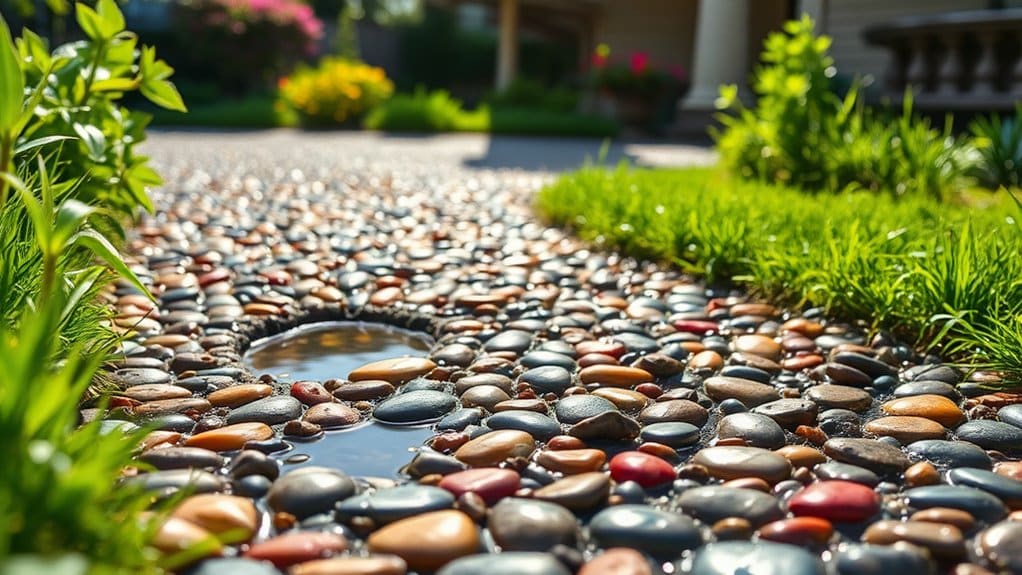
Many assume gravel surfaces don't allow water through, but resin-bound gravel is actually highly permeable. It lets rainwater drain naturally into the ground rather than forming puddles or running off like it would on tarmac or concrete. This makes it brilliant for British gardens and driveways, where we get plenty of rain.
Unlike solid surfaces, resin-bound gravel works well with sustainable drainage systems (SUDs), helping manage water locally instead of overwhelming storm drains. It's particularly useful in urban areas where flooding can be an issue during heavy downpours. The system naturally filters water back into the soil, supporting local plant life and helping maintain ground moisture levels. Additionally, its high permeability helps reduce strain on existing drainage infrastructure, further mitigating flooding risks, which is essential for effective urban water management.
The surface looks smart whilst being practical – you get the attractive finish of gravel without the loose stones, plus excellent drainage that meets current planning regulations.
It's a sensible choice for anyone looking to improve their property's water management whilst maintaining kerb appeal.
Maintenance Myths Debunked

Common misconceptions about resin-bound gravel maintenance need setting straight:
- Low Maintenance: A quick brush every few months and an annual wash is all you need – much like caring for a garden path. This minimal upkeep contributes to its long-term value.
- No Sealing Required: Unlike block paving, resin-bound gravel doesn't need sealing. In fact, sealants block the essential drainage properties.
- Weed Management: Whilst incredibly resistant, some weeds might appear at the edges. Simply check quarterly and remove any growth before it takes hold.
- Safe Cleaning: A standard garden brush and occasional pressure wash work perfectly. Skip the harsh chemicals – they'll damage the surface. Think of it like cleaning your patio furniture.
Durability Doubts Addressed
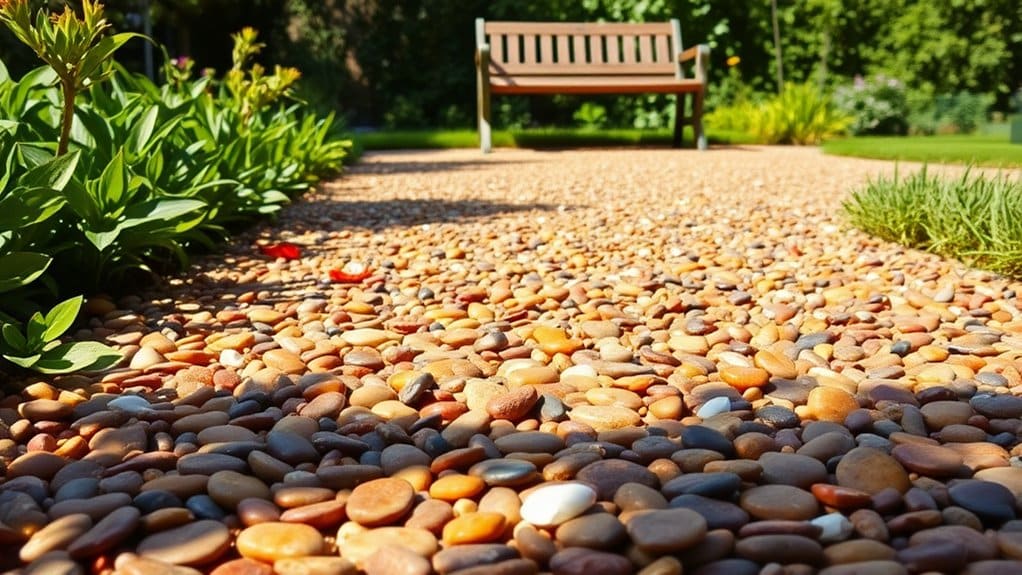
Thinking about resin-bound gravel for your driveway?
You'll be pleased to know it's remarkably durable, typically lasting 20-30 years when properly installed and maintained. Quality resin and stone combine to create a sturdy surface that often outlasts traditional tarmac driveways. While it's best suited to standard family vehicle use rather than heavy lorries, it holds up brilliantly for most UK homes. The surface copes well with British weather, particularly when UV-stable resin is used to prevent sun damage. Much like choosing a good builder for your house, proper installation is crucial – get it right, and you'll have a long-lasting, attractive driveway that's both practical and eco-friendly. Additionally, the quality of resin and aggregates used can significantly enhance the longevity of your driveway. Regular maintenance, including scheduled inspections, is essential for identifying potential issues early and prolonging its lifespan.
Understanding Cost and Affordability
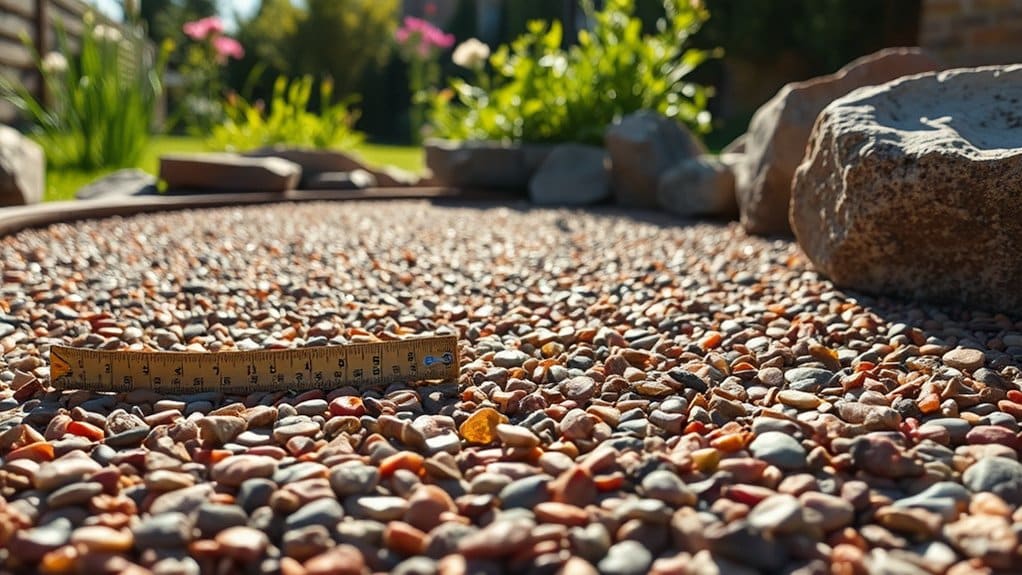
Considering a resin-bound gravel driveway requires careful assessment of both durability and cost.
The typical cost breakdown for UK properties:
- Installation costs £90-£125 per square metre
- Materials average £42 per square metre
- Regional pricing varies, particularly for labour
- Planning permission and VAT must be factored in
Budget-savvy tips: use online cost calculators for personalised estimates, check local contractor rates, and obtain at least three quotes.
Though costlier upfront, resin-bound gravel proves cost-effective through minimal maintenance and lasting durability. Proper surface preparation and experienced contractors are crucial for installation success.
The Truth About the Installation Process
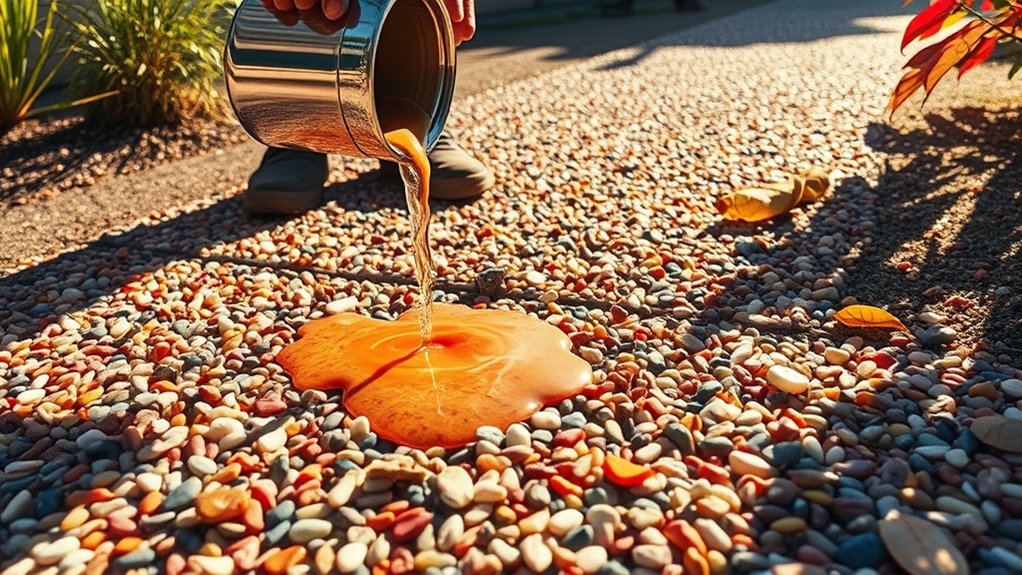
Getting resin-bound gravel right demands proper know-how. A skilled installer will ensure you don't waste money fixing amateur mistakes later.
The groundwork is crucial – think of it like laying house foundations. Your base must be spotlessly clean and rock-solid.
British weather plays a major role too; you'll want a dry spell for proper curing, ideally between 5-30°C. Rain or extreme temperatures can ruin the finish, so timing matters.
Best to leave this job to the professionals who know their stuff.
Professional Expertise Required
Professional Installation: Why It Matters
Getting resin-bound gravel right demands proper training and expertise. Whilst DIY might seem tempting, professional installers bring crucial knowledge to ensure lasting results.
Key reasons to trust the experts:
- Perfect Mixing Ratios: The resin-to-aggregate balance must be spot-on – much like baking, where precise measurements make the difference between success and failure.
- Professional Tools: Specialists use industrial-grade equipment that most DIYers simply can't access.
- Working Against Time: Once mixed, resin starts setting quickly. Professional teams know exactly how to manage these tight timeframes.
- Material Expertise: Different projects need different materials. Professionals understand which combinations work best for your driveway, garden path or patio.
A botched DIY job often costs more to fix than hiring professionals from the start.
Think of it like rewiring your house – some jobs are best left to those with proper training.
Base Preparation Importance
A proper base is vital for any resin-bound gravel driveway or path to last. Start with concrete or asphalt – never use block paving or bare soil, as they'll shift over time. Think of it like building a house: without solid foundations, everything above will fail.
The sub-base needs MOT Type 1 or Type 3 stone at 100-250mm depth, depending on your ground conditions. For example, clay soil needs a thicker base than solid rock. Compact each layer thoroughly until it's firm and level, much like preparing a cricket pitch.
Before laying resin, ensure the base is clean and even. Any dirt or dips will show through in the finished surface. Good drainage is essential – in British weather, the last thing you want is puddles forming on your drive.
A well-built base might take more time and effort, but it's the difference between a driveway that lasts 15 years and one that cracks after the first frost.
Weather Impact on Installation
Weather's Role in Resin Installation
Getting your resin-bound gravel laid properly depends heavily on British weather conditions.
Essential points:
- Install when it's between 5°C and 25°C – typical spring or autumn temperatures work best
- Skip rainy days and watch humidity levels (50%-70% is ideal)
- Best to crack on early morning, before the day heats up
- Keep an eye on the dew point – much like watching for morning frost on your car
Aesthetic Appeal and Customization Options
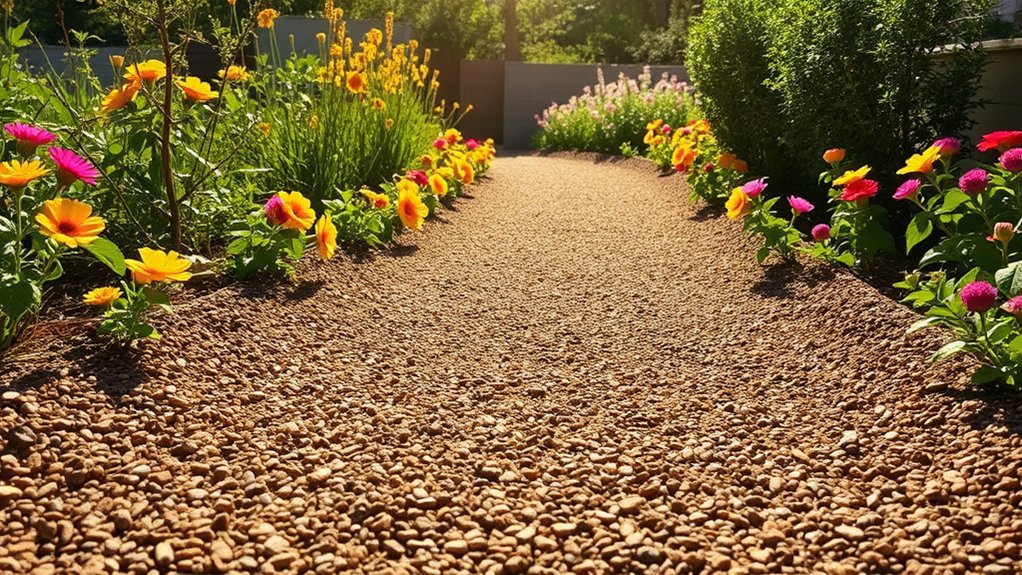
Resin-bound gravel offers brilliant aesthetic appeal and plenty of ways to customise your outdoor space. The colour range includes everything from natural browns and greys to bold statement shades, perfect for matching your garden's style.
Different textures are available too, letting you create anything from smooth driveways to textured garden paths that blend naturally with the surroundings.
This surfacing works brilliantly with both contemporary builds and period properties – imagine a smart grey finish complementing a modern home, or warm honey tones setting off a traditional cottage.
Whether you fancy small pebbles for a courtyard or larger stones for a grand driveway, resin-bound gravel helps create outdoor spaces that truly reflect your taste whilst maintaining a sophisticated look.
Addressing Concerns About Slip-Resistance
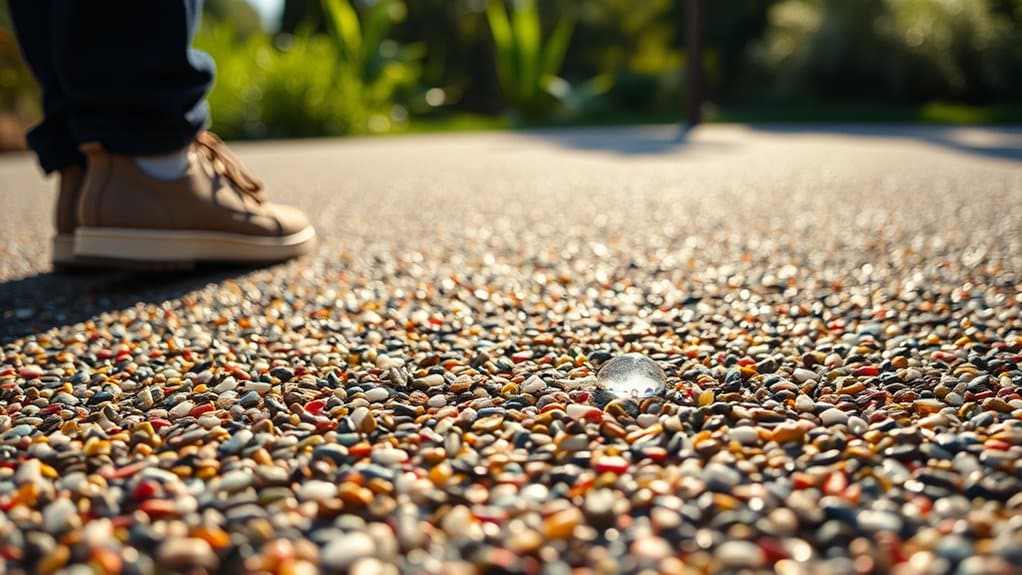
Slip-Resistance of Resin-Bound Gravel
Resin-bound gravel offers excellent grip for your outdoor areas. The surface's natural texture provides reliable slip resistance in typical British weather conditions.
Key points about slip resistance:
- British Standards testing confirms the surface meets and exceeds safety requirements.
- Textured finish gives good grip in rain and frost.
- Optional additives like crushed glass boost grip further.
- Maintains slip resistance longer than traditional paving.
Perfect for driveways, paths and patios where safe footing is essential, particularly in wet weather.
Longevity and Quality of Resin Bound Surfaces
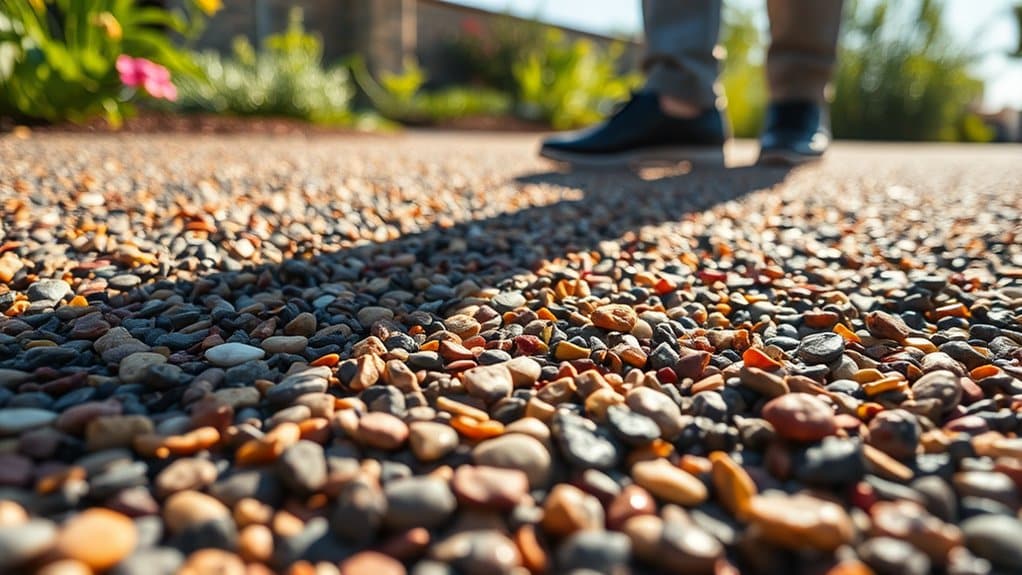
A well-installed resin-bound surface typically lasts 25-30 years. Key factors affecting its lifespan include British weather conditions, installation quality and the grade of materials used.
Premium resins and aggregates ensure better durability, whilst heavy foot traffic and harsh weather can wear down the surface.
Regular upkeep is essential – a quick sweep and occasional power wash will keep your surface looking fresh and working properly.
Much like a garden patio or driveway, catching problems early prevents costly repairs later.
Think of it as a long-term investment for your property – choose quality materials and maintain them properly, and your resin-bound surface will serve you well for decades.
Frequently Asked Questions
Can Resin-Bound Gravel Be Used in Residential Areas?
Resin-bound gravel works brilliantly in residential settings across the UK, from driveways to garden paths. It's tough enough to handle daily foot traffic and parked cars whilst looking smart and modern. Common uses include front gardens, patios and walkways – anywhere you'd want a smooth, puddle-free surface. Just check with your local council first, as some areas have specific guidelines about driveway materials and drainage requirements.
How Does Resin-Bound Gravel React to Vehicle Traffic?
Resin-bound gravel holds up brilliantly under most vehicle traffic, perfect for your typical household driveway. Whilst it's tough enough for daily use by cars and small vans, best avoid parking lorries or heavy machinery on it. Think of it like a sturdy pair of walking boots – brilliant for everyday wear but not meant for marathon running. A bit of basic upkeep, like sweeping and occasional pressure washing, keeps it in top nick for years of typical family vehicle use.
Is Resin-Bound Gravel Suitable for Steep Slopes?
Resin-bound gravel works brilliantly on steep slopes when properly installed. Its unique bonding system keeps stones firmly in place, much like a strong glue holding everything together. The surface allows rainwater to drain through whilst providing solid grip underfoot – particularly useful for those tricky hill driveways common across the UK. Just ensure a qualified contractor handles the installation, as the slope's angle requires specific laying techniques.
Can I Install Resin-Bound Gravel Myself?
Installing resin-bound gravel as a DIY project is possible but requires careful planning and attention to detail. Whilst the process isn't overly complex, proper preparation and timing are crucial, as the resin must be laid within a specific temperature range and mixed precisely. The job demands some experience with surface preparation and a good understanding of the materials. Consider starting with a small area, like a pathway, before tackling larger projects such as a driveway. If you're unsure, it's worth consulting a professional, as mistakes can be costly to rectify.
What Maintenance Is Needed During Winter Months?
Regular winter upkeep of resin-bound surfaces requires sweeping, treating icy patches with grit or salt, and clearing snow with plastic shovels to avoid surface damage. Check regularly for any loose areas and ensure proper drainage to maintain the surface's quality throughout the cold months.
Conclusion
Resin-bound gravel is a practical choice for British driveways and paths, despite common doubts. It offers excellent drainage, making it ideal for our rainy climate, and requires minimal upkeep compared to traditional paving. While the initial cost might seem steep, its long-term durability makes it a sound investment – typically lasting 15-20 years with proper installation. The surface stays firm and stable, much like tarmac, but with a more attractive finish. Perfect for both modern and period properties, it's slip-resistant even in wet weather and meets SUDs (sustainable drainage systems) requirements. Don't let myths put you off; resin-bound gravel delivers both kerb appeal and functionality.
